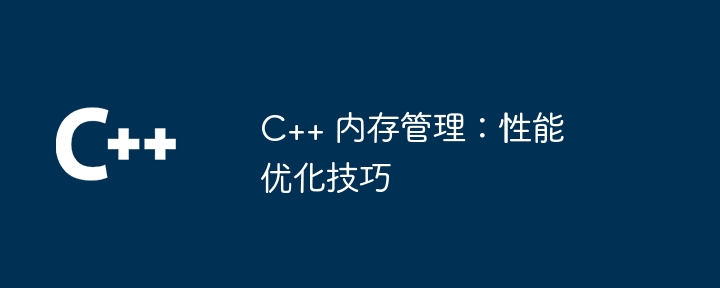Home >Backend Development >C++ >C++ Memory Management: Performance Optimization Tips
C++ Memory Management: Performance Optimization Tips
- 王林Original
- 2024-05-03 14:54:01698browse
C Memory optimization skills include: understanding the memory model, allocating appropriate memory, releasing memory in time, using smart pointers, optimizing memory layout and avoiding unnecessary copies. Smart pointers (such as unique_ptr) automatically manage pointers to objects and help optimize code, such as replacing explicit release of memory with automatic release.

C Memory Management: Performance Optimization Tips
Memory management is critical to optimizing the performance of C programs. The following tips will help improve the efficiency and reliability of your code:
1. Understand the C memory model
Understanding the C memory model is important for formulating effective memory management strategies. Crucial. It defines the relationship between variables, objects and memory addresses.
2. Allocate the correct memory
Allocate the appropriate memory type based on the expected usage of variables and objects. For example, use heap allocation to store large or dynamically allocated data.
3. Release memory promptly
When a variable or object is no longer needed, use delete or delete[] to release it The memory they allocate. This is very important to prevent memory leaks.
4. Use smart pointers
smart pointers (such as unique_ptr, shared_ptr and weak_ptr ) automatically manages pointers to objects. They help avoid wild and dangling pointers.
5. Optimize memory layout
By organizing related data into structures or classes, memory access efficiency can be improved. This will produce fewer cache misses when accessing the same memory region.
6. Avoid unnecessary copies
Passing objects by reference or pointer instead of making copies can save memory and time.
Practical case: Optimizing code using smart pointers
Consider the following code snippet:
int main() {
int* ptr = new int; // 分配内存
*ptr = 10; // 设置值
delete ptr; // 释放内存
}This code can be optimized by using smart pointers:
int main() {
unique_ptr<int> ptr(new int); // 分配和所有权传递给智能指针
*ptr = 10; // 设置值
} // ptr 的析构函数自动释放内存Using smart pointers eliminates the need to explicitly free memory, making code cleaner and eliminating potential memory leaks.
The above is the detailed content of C++ Memory Management: Performance Optimization Tips. For more information, please follow other related articles on the PHP Chinese website!

